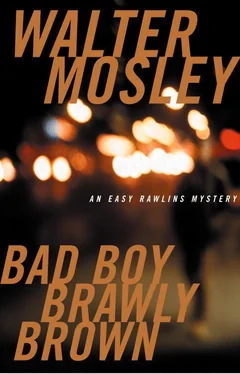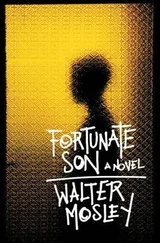But something was nagging at the back of my mind.
On the way I asked Strong, “Are Xavier and Brawly friendly?”
“I don’t really know.”
“No? I’d think the head of a group like the First Men would know all about what his people were doing and how they got along.”
“I’m not the head of the organization. As a matter of fact, I am not, strictly speaking, a member.”
“No? Then why they treat you like some kind of king?”
“I’m an activist from the Bay Area. I live in Oakland. I have a small following up there.”
“But they said that you started the First Men.”
“That was just an accolade of generosity,” he said. “I was a good friend of a man named Harney, Phillip Harney. He was their spiritual model. His aura spilled over on me.”
We drove down toward Compton. Down past Rosecrans Avenue and Alondra Boulevard not far from John’s tract of homes.
The nagging doubt stayed with me.
When the road turned to gravel I looked up at the temporary street sign, which read A227-F. It made sense to me that Brawly would hide out in some empty house near the construction site where he was employed for so long. He knew the area, the security systems, and the schedules of the workers.
That’s when it came to me. Strong didn’t strike me as the kind of man to pick up the tab for some stranger. Maybe for a pretty girl or for some political big shot, but not for some man he didn’t know and not for a fly in his soup like Brawly.
It wasn’t yet five, so the skies were still dark. We pulled up in front of a house that was almost completed. When Strong turned off the engine my heart was already pumping. I was excited, at the end of my search, but I was also leery.
“Let’s go,” Strong said.
“Go where?”
“In the house.”
“Excuse me for doubting you, Mr. Strong, but this isn’t exactly what I had in mind. I mean, why is the house so dark?”
“It’s dark because they’re not expecting us,” he said in a sensible, matter-of-fact tone.
“They who?” I asked just as reasonably, if a little more strained.
That’s when Strong produced a pistol.
“We have just a couple of questions, Mr. Rawlins.”
I held myself back from attacking the First Man. He was big, like I said. I didn’t even know if I could have taken him if he was unarmed.
“Get out,” he ordered.
I opened my door with him close behind, giving me no chance to slam the door on him or run.
We walked down what would one day be a concrete path to the house’s front door.
“Don’t get all worried, Mr. Rawlins,” Strong said as we walked. “We just want to make sure that you are what you say you are.”
I wanted to believe him, but the fact that there was no light on in the house made me doubt his intentions.
When we were halfway down that path the front door swung inward. I couldn’t see into the house but I did hear a sound: a snick and crack. Then the self-professed race man yelled, “No!”
Six months of battle on the front lines under Omar Bradley and Patton are what saved my life. I hit the ground, rolled over twice, was up on my feet running a zigzag pattern down the length of the neighboring house-to-be. Strong was right behind me, wasting strength by yelling for his life. All this while shots were being fired. Bullets whizzed past my head. Strong’s yell cut off on a sudden high note. I zigged to the right, heading for the cover of a house. I looked over where Strong had been. His body was on the ground and inert. A man was standing over him, shooting point-blank at his head. I took in that image in just a fraction of a second. Then I dove past the side of the house, jumped over a pile of rolled tar paper, and kept running hard. I heard at least two men yelling, and three shots were fired in my direction. But I kept running.
After two blocks I started wheezing. Maybe thirty feet after that I felt a terrible pain in my chest. I veered to the right and fell on the ground next to an unfinished porch. I laid flat in the shadows thrown by a security night-light, my ragged breath sounding like two vinyl records being rubbed together vigorously.
I almost lost consciousness.
After a few minutes a car drove by slowly. There was no flashing red, so I was pretty sure that it wasn’t the cops. It took at least fifteen seconds for them to roll past.
After they were gone, and I had caught my breath, I walked six blocks to the main street. By then it was a little after five and the buses were beginning their routes. The bus I boarded hadn’t gone more than four blocks when six county sheriff cars, sirens wailing and red lights flashing, sped in the opposite direction, toward the place where I’d almost died.
I got my car from Mariah’s parking lot and drove down to Sojourner Truth. After parking in the lower lot, I held my hands in front of my eyes. They weren’t shaking.
Then I made my way to the maintenance bungalow. We called it the main building as a kind of abbreviation and, maybe, as a comment on who really kept the school running. It wasn’t even six o’clock. Nobody would bother me for over an hour and a half.
The custodians’ bungalow was a storehouse of cleaning materials, locks and keys, paper items, and tools. Twelve day janitors and a night crew of five were needed to maintain the 132 classrooms, two locker rooms and showers, the gym, the garden, the auditorium, and seventeen office spaces that constituted the school. We had fourteen buildings, upper and lower asphalt recreation yards, and eighteen gates that had to be locked and unlocked every day to keep students in, and to keep them out, too.
My office nook was made up of a battered ash desk, a padded green swivel chair, two filing cabinets, and five key rings, with just under three hundred keys, hanging from a peg on the wall.
I brewed coffee in the twelve-cup percolator and set fire to a Chesterfield that I promptly snubbed out because when I was running from those gunmen I realized that smoking could kill me without the heart disease and cancer they were talking about in the papers. A man as short on breath as I was would surely die if he couldn’t keep ahead in the rat race.
The coffee was great. Not too strong but full of the flavor of life. It contained the taste of my survival. There I was, alive and safely hidden in the bosom of Sojourner Truth.
I wondered who had killed Strong and why. Were they the confederates he had expected to question me? Did his friends lay a trap for him, too? Or were our attackers another group who were set against Strong and his First Men?
When I heard that bullet snap into the chamber, all my senses fled, bidding my body to follow. I didn’t see the man who shot Strong long enough to have noted even the most general description. Height, weight, even his color were unknown to me. What I mostly saw was the flash of his pistol.
One thing I was sure of was that Strong was dead. I didn’t feel bad about not going back. There was no saving him. And even if I could have helped, he had been holding me at gunpoint. My only worry was if someone had put me on their hit list, if I had somehow made someone scared enough to need me dead.
The men who fired at us had certainly meant to kill us both. It was also almost certain that they were the ones cruising around in their car looking for me. Maybe they thought Strong had told me something.
A normal working-class man would have been petrified in my position. But I had been through worse.
My childhood had been just as rough. Many a time I was sure that someone was going to kill me. But the threat of tomorrow was never as urgent as making it through today. So I was able to put the killers temporarily out of my mind while making the rounds of the school.
Читать дальше












